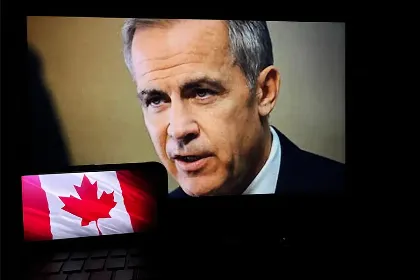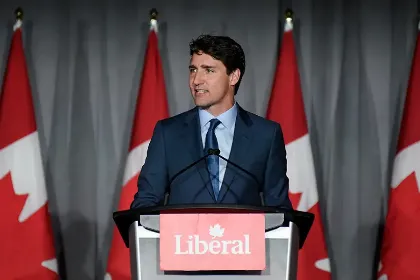
The political landscape is shifting dramatically as Canada grapples with economic uncertainty and rising living costs. Pierre Poilievre, the leader of the Conservative Party, has seen a significant surge in popularity, positioning himself as a champion of Canadians struggling with financial pressures. His rise is a crucial reminder of how deeply the cost of living impacts voter behavior and election outcomes.
The Economic Context: Rising Costs and Economic Anxiety
Canada is facing a period of economic strain, with inflation hitting multi-decade highs and the cost of essential goods and services climbing rapidly. According to Statistics Canada, inflation reached 8.1% in June 2022, the highest rate in nearly 40 years. Soaring prices in key areas such as housing, groceries, and fuel have driven this surge. Housing affordability, in particular, has become a critical issue. The Canadian Real Estate Association reported that the average home price in Canada increased by nearly 50% between 2015 and 2022, pushing homeownership out of reach for many Canadians, especially younger generations. Rental prices have also surged, adding to the financial burden on households. The rising cost of groceries has further strained household budgets. The Agri-Food Analytics Lab at Dalhousie University found that Canadian families spent an average of $966 more on groceries in 2022 than they did in 2021, driven by inflationary pressures on food items. Poilievre has blamed the incumbent Liberal government for these rising living costs.
Poilievre's Messaging: Focusing on Affordability
Pierre Poilievre has tapped into the growing economic anxiety by focusing his messaging on affordability and the cost of living. His campaign has emphasized the need to “Axe the Tax”, reduce government spending, and control inflation. Poilievre uses short slogans that convey both a need for change and a critique of the incumbent Liberal government. For example, Poilievre's famous slogan “axe the tax", refers to getting rid of The Trudeau government's carbon tax. The carbon tax remains an unpopular policy among voters. An Abacus Data poll from June of 2024 showed that 22% of Canadians view the federal carbon tax as one of the biggest causes of inflation. Another slogan from Poilievre is “fix the budget”. Poilievre consistently reminds voters during question period and on social media that the incumbent Liberal government's “inflationary deficits” are responsible for unaffordability.
Poilievre’s promise to make life more affordable for Canadians resonates with voters who feel left behind by the current economic system. Many see his proposals to cut taxes, repeal the carbon tax, and streamline government regulations as concrete steps to ease financial pressures on households.
The importance of party leaders
The two major political parties in Canada, the Liberals and the Conservatives are designed to win elections. The parties are built in a way that gives party leaders an abundance of influence over their party. The party leader is in charge of laying out the campaign platform and selecting the campaign strategy for the election campaign. Due to the great influence of party leaders, they are credited their party's electoral success or failure (Malcolmson, 2021). The Conservatives have been ahead of the Liberals in the polls for months and have a double-digit lead over them, showing that Poilievre's leadership has positively impacted the Conservative Party of Canada. Poilievre has a different style of leadership in comparison to his predecessors. Poilievre has made the messaging of the Conservative Party primarily about the cost of living, Canada being broken, and the incumbent government's failure to make Canada more affordable. This approach benefits the Conservatives because the cost of living affects the entire middle class, not just one segment of the population. The Conservatives centering their message around affordability makes them much more attractive to a wide pool of voters in the electoral market.
The Appeal to Younger Voters
One of the most notable aspects of Poilievre’s rise is his appeal to younger voters, a demographic traditionally less inclined to support conservative candidates. According to a survey by Abacus Data in mid-2023, Poilievre’s popularity among voters aged 18-34 has grown substantially, with many citing affordability as their top concern.
The survey indicated that 41% of young voters viewed Poilievre as the best leader to address their economic concerns, a significant increase from previous years. His message resonates particularly well with millennials and Generation Z, who face unique financial challenges, including student debt, high housing costs, and stagnant wages. In addition, the average down payment for a home has gone up in recent years, making it much more difficult for Gen Z to buy a home. Poilievre's slogan for this particular issue is “build homes not bureaucracy”. This slogan both assures voters that the supply relating to the housing market will go up to match the demand of housing. In other words, Poilievre is promising younger voters that they will be able to afford a home. This approach marks a stark contrast with Justin Trudeau, who said “housing is not a federal responsibility”.
Challenging the Status Quo: Poilievre's Anti-Establishment Appeal
Poilievre's rise is also characterized by his anti-establishment rhetoric. He has positioned himself as a leader willing to challenge the status quo and confront the elites whom he blames for Canada’s economic challenges. This populist approach has garnered support from voters who feel disillusioned with traditional political leaders and institutions.
His criticism of the Liberal government’s handling of the economy, particularly its spending policies during the COVID-19 pandemic, has struck a chord with voters concerned about Canada’s growing national debt and the long-term economic implications of pandemic-related spending. As of March 2023, Canada’s national debt stood at over $1.2 trillion, a significant increase from pre-pandemic levels.
The Cost of Living: A Decisive Factor in Elections
The focus on cost of living is not unique to Canada; it has been a decisive factor in elections around the world. When voters face economic uncertainty, they tend to prioritize financial stability and security in their electoral choices. Poilievre’s rise in popularity underscores this trend, as he continues to gain traction by addressing the economic realities faced by millions of Canadians.
Another prominent example of the cost of living having a significant impact on the outcome of an election is this year's UK general election. Inflation and the cost of living prompted the need for a change in government by the voters, as the incumbent Conservative government was unable to fix rising unaffordability in the UK. The Tories were voted out of government and suffered one of the worst defeats in their history as a political party. One electoral strategy of the Labour Party this election year was to blame 14 years of Conservative governance for rising living costs. The voters agreed with Labour, who won 412 seats while the Tories only won 121.
As the next federal election approaches, the cost of living is likely to remain a central issue. Voters will be looking for leaders who can offer practical solutions to the economic challenges they face daily. Poilievre’s ability to connect with these concerns has positioned him as a formidable contender, making the cost of living a critical battleground in Canadian politics.
Conclusion
Pierre Poilievre’s surge in popularity is a powerful example of how economic issues, particularly the cost of living, can shape political dynamics. As Canadians continue to grapple with rising prices and economic uncertainty, Poilievre’s focus on affordability and financial relief has resonated with a broad spectrum of voters. His rise serves as a reminder that in times of economic strain, the cost of living is not just a policy issue—it’s a pivotal factor that can determine the outcome of elections.
Sources:
- Statistics Canada, "Consumer Price Index, June 2022."
- Canadian Real Estate Association, "National Average House Price Data."
- Agri-Food Analytics Lab, Dalhousie University, "Annual Food Price Report 2022."
- Abacus Data, "Polling Data on Voter Preferences, 2023."
- Department of Finance Canada, "National Debt Data."



